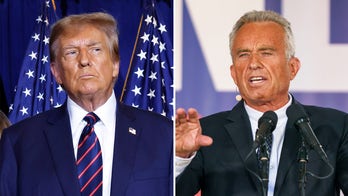
U.S. Sen. Ted Cruz on May 9, 2015 in Greenville, South Carolina. (2015 Getty Images)
Ted Cruz's bid to win the 2016 Republican presidential nomination has got off to a rocky start.
The Texas senator is stuck in the middle of a very crowded GOP field, has floundered in the polls, has made some costly comments during speeches and is seen as a plague by many wealthy Republican donors.
So in an attempt to jumpstart his campaign and win over new voters, the often unconventional politician is – you guessed it – doing something unconventional. Instead of focusing on the traditional early season caucus and primary states like Iowa and New Hampshire, Cruz has hit the road for places like Michigan, Massachusetts and North Carolina in the hope of winning over voters in states that hold later primaries.
"Our strategy is taking it to the convention, which is why you've seen us announcing chairmen in California and New Jersey, as well as Iowa and New Hampshire," Mark Campbell, Cruz's political director, told Politico. "There are 2,470 [delegates] total, and you need 1,236 of them to win. None of these can be accumulated at any one time, which is why it's a marathon more than a sprint. So we are methodically going state by state, focusing on grassroots and party activists."
Cruz hasn't completely abandoned Iowa – he recently spoke at the Iowa Faith and Freedom Coalition summit and his campaign still hopes to place "in the top three" during the state's caucus – but the Texas lawmaker is betting that delegate counts will get him farther along to the nomination than battling out in either the Hawkeye or Granite states alongside his Republican counterparts.
"We expect to do well in all of the early primary states, which will give us sufficient momentum to do extremely well in the March 1 primaries … and caucuses," he said. "Obviously Iowa, New Hampshire, South Carolina and Nevada are important, but then there are many large states that will be distributing their delegates starting March 1."
In one out of the way campaign stop, Cruz went to his home state of Texas earlier this week to court Latino voters in the border city of McAllen — an area generally considered a Democratic stronghold.
"It's important for every presidential candidate to address seriously the problem of securing the border and to have a serious plan and to demonstrate a willingness to enforce the law," Cruz said, according to the Texas Tribune.
Cruz's campaigning outside of Iowa and New Hampshire, however, has not gone as smoothly as he probably hoped.
In Michigan, where he was trying to woo the auto workers and union members who have in the past balked at the fiercely conservative Texan, Cruz made a joke about Vice President Joe Biden that drew backlash as it came just days after Biden's son died. Cruz was forced to apologize.
Political strategists also warn against not putting emphasis on the two early states as it's historically rare for a nominee to clinch the party's nomination without winning at least one of the first two nominating contests. The assumption is that the only candidates who ignore – or at least don't put as much emphasis on – those states are the ones who are struggling and need to get a jump on the later primaries.
"Candidates who play down the importance of a strong showing among early primary states do so out of necessity, not choice," Chris Maloney, a senior vice president at Black Rock Group who worked for Mitt Romney, told Politico.
"While super PACs now carry the potential to sustain candidacies in place of early victories, it's difficult to envision a scenario where the eventual nominee does not possess a first-place finish in an early nominating contest. Campaign capital — donations, personnel — flows with momentum, not against it, and makes recruiting delegate slates, notaries and attorneys well-versed in onerous and often costly ballot-access requirements that much easier among states with later contests."
Whatever happens in either Iowa or New Hampshire, Cruz has set his sights on winning the states that vote on March 1 – Massachusetts, Georgia, Oklahoma Tennessee and Texas – and moving on to states such as Michigan and Mississippi, which vote on March 8.




